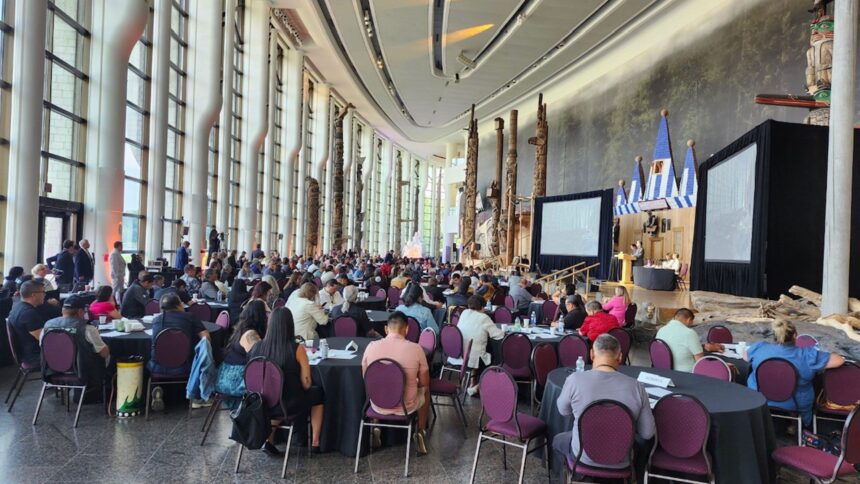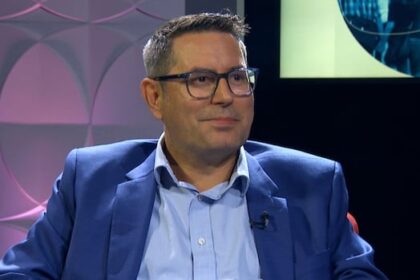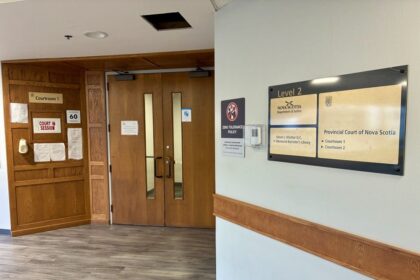A recording of the first meeting between government officials and First Nations leaders obtained by APTN News reveals the chiefs’ concerns over the rush to push Bill C-5 into law and the lack of clear commitments to communities across the country. The session on Wednesday took place in what is known as the Great Hall of the Canadian Museum of History—the floor dedicated to Indigenous peoples. It was the first time government officials briefed First Nations leaders and rights holders on the new law. After attending a legal review organized by the Assembly of First Nations earlier in the week, chiefs came armed with questions that centrered mostly on three core concerns: the bill’s potential to exacerbate environmental harm, the lack of free, prior and informed consent and the absence of revenue-sharing mechanisms that would allow Indigenous nations to benefit fairly from development on their lands. For many First Nations leaders, it was their first chance to express deep concerns about the legislation directly to the government—unfortunately, after it had already passed. The tone was polite, but occasionally icy “ Thank you for hosting this session, this subjugation session –not a consultation session, “ said Atikameksheng First Nation Chief Craig Nootchta. ”What you see here, all the people that are gathered here, came a long way to share that what Canada’s doing is not correct, “ said Chief Tony Alexis of the Alexis Nakota Sioux Nation. “We don’t see us being a part of it. So everybody that you see here is coming from a place of. questioning you and asking Canada, what are you doing? It’s more of a protest that you’re experiencing here. It’s not an engagement. “ The first day was dedicated to a technical briefing and question and answer session on the federal government’s controversial Building Canada Act, also known as Bill C-5 The law was passed with little or no consultation on June 26 after only two weeks of legislative debate. What emerged from the meeting was not just policy debate, but a strained relationship, growing legal resistance and the question chiefs are now struggling with, including can the One Canadian Economy Act be fixed—and can trust be repaired? Environmental destruction and ignored objections The Building Canada Act gives Cabinet the power to fast-track approvals for major infrastructure projects such as mines, pipelines, and hydroelectric dams by designating them as “projects of national interest.” But the system for protecting land and waters is already broken, according to a number of chiefs who spoke and their fear is that speeding up approvals will only make it worse. Billy-Joe Tuccaro, chief of Mikisew Cree Nation in Alberta, said during the meeting that the water surrounding his community has been impacted by development upstream. He told officials that 50 people in his community have been diagnosed with cancer and he blames the contamination in the water. “I can say this clearly and loudly that if Canada and industry do not change their water guidelines, you guys will also be burying people like me,” said Tuccaro. “We’re tired of being studied. The treatment release of the tailing ponds. Will never be accepted by my people unless you guys build a pipeline and you drink it first.” Chiefs in the room broke into applause. Shana Thomas (Laxele’wuts’aat), a hereditary chief for Lyackson First Nation, said the problem is that industry stalls consultation with First Nations, then ignores their concerns and moves ahead. “While the mainstream environmental assessment process is carrying on, we’re dancing around the table for eight months trying to negotiate an agreement to get payment, to be able to participate in the Indigenous-led assessment. And then the proponent wants to call that accommodation, which it is not,” said Thomas. She said that in her experience, if there is a disagreement over how a resource like fish is impacted, industry simply moves forward. “They say ‘we don’t agree, we think it’s fine and we’re just gonna go ahead.’ So it’s not just about Indigenous led assessment, it’s about how colonial institutional frameworks interpret that knowledge.” Nootchtai added that industry does not take consultation seriously—it is treated as a box to check before moving ahead. “When they’re given the upper hand, they know that they’re going to get their permit because that’s the legacy, that’s the system that’s in place right now,” said Mootchtai. “So this doesn’t really mean anything right now until we get a legislation piece that says we will get free prior and informed consent before any project is allowed.” Risk without reward Chiefs from Manitoba outside the summit on Wednesday. Photo: Karyn Pugliese/APTN. Nootchtai said his community bears all the risk from five active mines surrounding their lands, yet sees few benefits. He said his First Nation has never consented to the development. “And we won’t give consent unless Canada really holds true to the word here today that they’re going to seek free, prior, informed consent for future projects,” said Nootchtai. “You say to us, we’re going to come to you and we’re going to consult with you, but at the end, you just delegate your authority to a proponent who then we have to fight with for resources to negotiate with them. Nootchtai said there is a “billion tons of slag and tailings” that were left on his lands and he wants the legislation to ensure there’s a “strong reclamation piece, any kind of agreements.” “Literally, if you fly over all you’re gonna see is a big lake of tailings. And if that ever goes, our community is wiped out. That’s, that’s the legacy that we’re dealing with right now,” he said. In response to environmental concerns, the federal officials at the summit, including deputy clerk of the Privy Council, Christiane Fox, and senior representatives from Crown-Indigenous Relations and Justice Canada, responded with reassurances. They told the chiefs that the Building Canada Act does not exempt national interest projects from existing environmental laws. They said projects would still need to comply with the Fisheries Act, Species at Risk Act, and other federal regulations. Rather than requiring multiple permits, these obligations would be consolidated into a single “conditions document” outlining environmental protections and mitigation measures. Officials also stressed that authority would not be delegated to project proponents and that federal departments remain responsible for enforcement. However, officials acknowledged that the legislation does not directly address legacy issues like tailings reclamation ‘You’re Dancing around’ free, prior and informed consent A common refrain among the leaders was that Bill C-5 does not enshrine free, prior and informed consent (FPIC)—a core principle of the United Nations Declaration on the Rights of Indigenous Peoples (UNDRIP). While officials said FPIC would “inform the approach” to consultation, they acknowledged it is not legislated in C-5. “You seem to be dancing around free, prior and informed consent today rather than giving us the assurance that we’re seeking,” said one chief. “I want to hear a commitment to government and a legislative requirement that the government get a free prior informed consent of any First Nation where a national interest project is going to pass through their territory or where they’re going to be affected.” “Yes, we are still kind of dancing around it in a way, but it is because it is a genuine desire to hear from communities, from leaders, about what this looks like on the ground,” replied one official. Fox cited sections of the Act that reference Section 35 of the Constitution and UNDRIP obligations, including mandatory consultation and public reporting. Still, officials conceded that a binding requirement for FPIC is not fully codified in the legislation leaving many leaders skeptical, arguing that verbal reassurances are not enforceable. “Some of my advisors, of course, say that there’s opportunity here, especially for business and I respect that, but treaty must be remain the foundation of these discussions,” said Alexis. “ How are First Nations to feel confident in what deputy clerk Fox states here? And how is that clearly laid out in the legislation?” asked Chief John Powell of the Mama̱liliḵa̱la First Nation. “Without clearly stating all of this in the legislation. These are just words. How can we go back and, and, and quote your words that you said in this room?” Continue Reading
Chiefs tell Canada summit should not be considered consultation according to leaked recording

Leave a Comment










